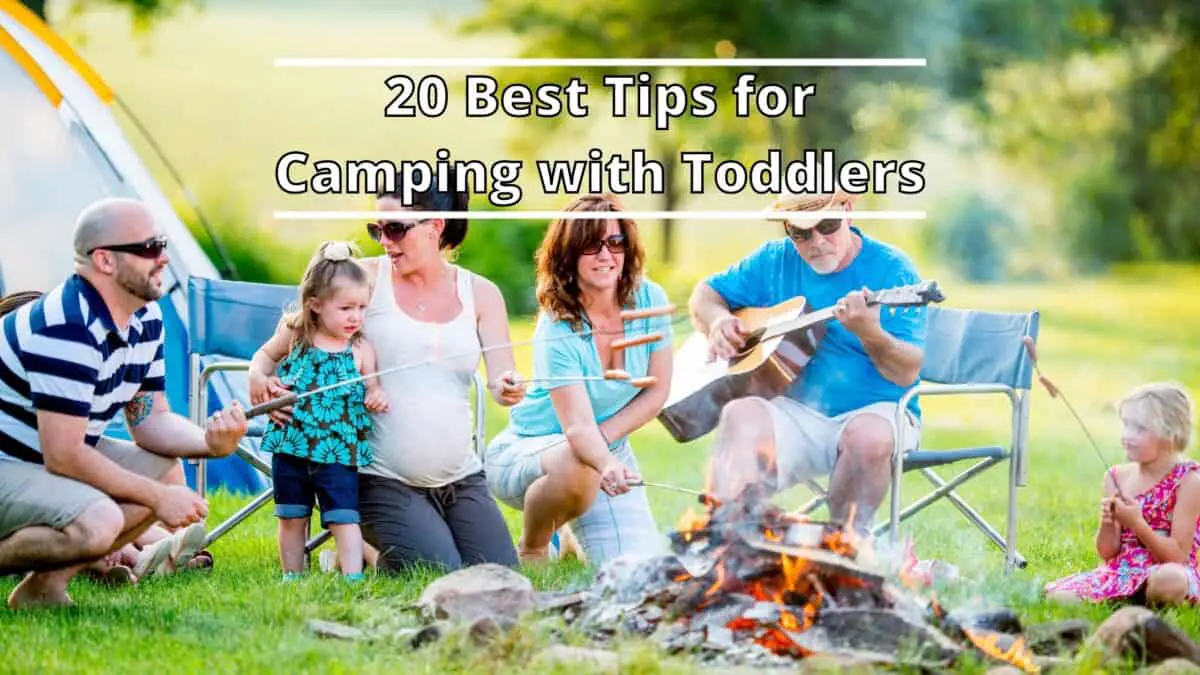Nature offers a grandeur experience. If you want to divulge a pinch of majestic views to your kids, and introduce the joys and calming beats of the outdoor life, then camping with them might be a good idea.
A camping trip with a family is a full-founded way to initiate your kids to the delights of being outside and can awaken their senses to their surroundings.
And camping with your toddlers can be a good experience. All you need is planning and a lot of versatility. You can practice camping at home, allow your kids to pack their things, choose the right campsite, bring lots of food, and make sure that your campsite is well-built to ensure that you’ll have a memorable experience.
In this article, we’ll discuss the best tips for camping with toddlers that you definitely need to know.
Camping is a good activity that will allow your toddler to enjoy nature. But, unlike regular camping with adults, there are certain things that you need to prepare so that your little one will be able to fully enjoy this activity. Read our essential guide for camping with toddlers to know more.
Here are our 20 tips
Taking your toddlers for camping can be both a dare and a great time. Yet, learning a few tips will help you ease your troubles. Try to maximize your experience with nature by building a sleeping environment, giving your children room to grow and explore on their own to ensure that they have a great time with you.
1. Exercise camping at home
If your toddlers are novices to the outdoors, place a tent on your lawn or even inside your home. Allow them to stay and sleep in a tent so they get comfy with new sleeping surroundings.
Check for a day outing around the area near your house. You can stay half a day and observe your kids’ reactions to different experiences.
2. Allow kids to help pack
Let your children help you pack their own camping gear, following the list you provided. However, make sure to check your kids’ packing work prior to leaving the home.
Stay orderly by having your kids pack personal things inside a duffel bag, and instruct them to habitually return the items inside the duffel.
3. Bring food toddlers like
Let your toddler assist in planning the menus, so they get excited about the camping trip. You can ask them what they want to eat and the treats they like.
Bring food you know they will like. Plus, pack ready-to-go snacks that are convenient while traveling and at the campsite.
4. Look for the right campsite
Choose a campsite with resources that you need for your family. Some campsites have swimming areas or beaches, rivers, playgrounds, and some have picnic tables and toilets.
If it’s your first camping trip, start with a place near your home, and fully-developed campsites with lots of services.
5. Think about safety
Once you arrive at the campsite, lay ground rules for where your toddler can stroll, and discuss what they should do if they get lost. Point out the boundaries and prohibit going to places you don’t perceive as safe for them.
Reprimand them if they go to other campsites or go to the bathroom without a companion. Finally, offer your kid a whistle and teach them to blow in it if they get far from you or get lost.
6. Build a pleasant sleep environment
Some kids can’t sleep without their favorite blanket and pillow, and stuffed toy. So, don’t skimp the pieces of stuff that are essential to their sleeping time. Bringing pillows and blankets from home can take you to a cozy sleeping moment.
For babies, you can use a portable crib if you have a tent that’s large enough for it. The more you have a camping experience, the more you’ll learn what are the necessary things to pack and what you don’t have to bring.
7. Dwell to a familiar bedtime routine
If you read books with your younger kids before going to bed every night, don’t omit it only because you’re camping. Kids love a routine. For babies, preserve their sleeping habits as much as possible.
8. Study the different activities available
Learn what day treks and other recreations are available at your target place. Prepare some possible activities for when your toddlers tells you they’re bored. Improved campgrounds usually have bulletin boards that draw up facile nature trails. Plan ahead and check if you can rent a boat or a chance to ride bikes.
9. Enjoin you kids
Although it feels like you can set your tent or cook a meal quicker by yourself, enjoin your children in camp chores. Train them on the basics; how to locate a flat tent site, cook a camp meal, or set up a tent.
Assign them with meaningful tasks according to their age. Younger children can help fill water bottles and set up sleeping bags, while older kids can help wash the dishes or cook a meal.
10. Prepare your gear
Arrange your camping gear in totes to secure it, and for easy access when you arrive at the camp. Use cardboard boxes or transparent plastic bins to keep your tent, sleeping bags, kitchen utensils, and other materials in different compartments.
Kitchen-related objects must be put into one box or bag, sleeping gear in a separate bin, etc. Consistently organizing the items will keep you organized for the next trip.
11. Dress up your kids in layers
Look at the weather and dress your kids accordingly. If there is a chance that it will rain, be ready with jackets. Temperatures can fall in the evening even if it’s sunny during the day.
So, prepare layers, thus kids can put on or take off clothes as needed, depending on the weather conditions. Infants and older kids need one more layer than what you’re wearing.
12. Bring a favorite toy
Pack one or two of your kids’ favorite toys or games, yet encourage them to play. Children are usually fond to see and play on campgrounds.
Kids will look for ways to build their own outdoor entertainment. If you bring toys, preferably take something that can be used outdoors, like a ball, kite, and a magnifying glass to snoop insects.
13. Add special items
You don’t have to buy a lot of gear; one or two special items can add up to your kids’ camping amusement. Decide to pack kid-size camping chairs or other camping gear, and glowsticks.
Let your kids have their own headlamp, flashlight, or another camp lighting.
14. Expect possible changes
You should know how your child will respond to circumstances. Try to solve potential troubles ahead of time.
If your toddler hates taking a bath at night, then you can prepare a small travel toilet that you can place outside your tent.
And if your teen is a light sleeper and wakes up late, prepare earplugs, so your child can sleep while the family is having breakfast.
15. Keep a positive attitude
Show the kids your excitement about your trip, so that they will feel enthusiastic too. Camping with kids needs preparation in coping with their nuisances as well.
The bathroom may be far and running water may not be always available.
16. Find learning moments
Regardless of their age, your kids are never too young to learn about the best exercises to abide by when they’re outside. Teach them how they could appreciate the environment while applying little tips to protect it.
Upskill them how to cherish the wildlife, how to throw the garbage properly, and practice the “Leave No Trace” principle.
17. Maximize the experiences in nature
Observe the wildlife using kid-friendly binoculars. Look at the bugs. Inspect the rocks. Know the flowers, birds, constellations, and clouds. Express your interest in things that can interest them.
You may bring an outdoor guide or guide books about nature to let them identify the animals or plants and study the things they find.
18. Take up the dirt
You can’t avoid kids getting dirty while camping. They could get mud on their clothes and shoes and get dust everywhere. Camping is a chance for them to feel messy.
For that, you can bring a camp rug and place it outside your door if you want to minimize the amount of dirt inside your tent.
19. Be versatile
Think that your purpose is to build a good structure for your kids to camp. The great thing about being outside is that you mold experiences as you travel. Be versatile and patient. Get rid of hectic schedules and relish the moment. Don’t pressure your kids into a day trek, even if your entire family wants to.
20. Leave room for growth
You’re not going to create an excellent experience on your first camping trip or on the second one. The most important thing in every trip is to know the things you should bring next time, what you can leave at home, and how to improve your trips.
Conclusion
Preparing alone with your limited ideas about camping with toddlers is not enough if you want to have a good time. Your family will face far different experiences after you have done some research about this activity. So, read some advice on how to successfully plan a camping trip with kids.
The 20 helpful tips we discussed above would answer your legitimate concerns about the things that you can do and prepare for a fun and fulfilling camping trip with your kids. We tackled planning and preparation before you go camping, the essential things you should bring, and our favorite kinds of stuff to bring for toddlers. Plus, the pieces of advice you should always remember when going outdoors is to keep the right attitude, especially patience and flexibility with your kids.
With the help of our tips above, we hope that you will be able to plan the best camping trips that your whole family will surely enjoy. Who knows, camping may become your new favorite outdoor adventure that will leave lasting memories and stories that you will fondly remember in the future.

